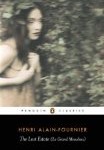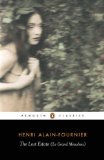Translated from the French by Robin Buss
Le Grand Meaulnes was first published in 1913 and is one of the most well known, and most loved classics in France today. It is, essentially, a fairy tale; the main character, Meaulnes, finds a mysterious house, with a beautiful girl hidden within it, but when he tries to return to the house, he cannot find it. For the rest of the book Meaulnes tries to discover what happened to him during his visit to the ‘Lost Estate’.
I read this book for Cornflower’s book group and I’m afraid I wasn’t very impressed by it.
My Penguin classic copy of the book has a note on the translation which I think sums up some of my frustration:
“…the typical Fournier sentence, with its subordinate clauses separated by commas, giving a nervous feel to the writing..”
I’m not sure “nervous” is the right word, I found it annoying! The writing just didn’t flow very well. I don’t know enough about the French language to know if this is a more natural way of writing things in French, but I found it very off putting.
It has been described by many as a book which is “untranslatable” and for many reasons I feel this is probably the case. Translation from French to English loses the subtle double meanings for many of the words. The most obvious being the ‘grand’ of the title which can mean, big, tall, great, daring, noble….etc.
I thought the quality of the writing was also very patchy. Some scenes were quite good, but others seemed to have been thrown in randomly and didn’t seem very well thought out.
Overall, I got little pleasure from reading this book. I think it is probably best read in French, preferably at a young age. Some of the other members of the book group really enjoyed this book. If you have a vast knowledge of French culture, and enjoy reading individual dream like sequences then this may be a book for you, but I didn’t enjoy it.


12 replies on “The Lost Estate (Le Grand Meaulnes) – Alain Fournier”
Interesting to read your review. This book has come highly recommended by a couple of people, and I just ordered it from Amazon. I’m curious: who translated your edition? Sometimes the translator can make all the difference.
I found your blog on MSN Search. Nice writing. I will check back to read more.
Eric Hundin
I love the premise of the book, and definitely would have picked it up based on that. Translation IS everythng…I wonder if there is more than one translated version out there?
Yes, sorry, I should have included the translator in my post – I’ve changed it now.
This book has been translated lots of times. It might be interesting to pick up another version and see if it is any better.
I think that all the members of the Cornflower group who liked the book read this version, so it must just be me!
Jackie,
I’ll be reading a translation by Frank Davison. There were a few different editions on Amazon, including your version translated by Buss. Since I ordered my copy on the recommendation of a friend, I asked for her opinion. My friend had read the Davison edition and compared it to the Buss using Amazon’s “see inside” feature. She felt the Davison was closer to the actual French (which she speaks & reads much better than I do!). So, we’ll see …
I’ll have to check in back here after I read it and let you know!
Laura, It’s interesting that your friend felt the Davison translation was closer to the French. I thought the problem with the Buss edition was probably that it was too close to the French, and so didn’t read very well in English! Please come back and let me know what you thought of your version though.
Thanks for the review. I don’t think that I would be very impressed with this book either.
When I was growing up in Montreal we read this book since French was compulsory and we had to read French Literature. Thanks for featuring this classic.
I think it sounds like a interesting book, but I have so many others waiting that I don’t think I’ll take a chance on this one. It sounds like the translation can make or break it.
[…] The Lost Estate by Alain Fournier completed 14th Febuary […]
Jackie, I kept this review “starred” in my Google Reader because I knew I’d want to return (and I just read the comment you left on my review).
It’s possible the translation had an impact on my impressions. While I don’t claim to have a “vast” knowledge of the French culture, I do have some knowledge (and I can speak and read French although not proficiently). This book felt very French to me, and I felt transported into the village and countryside.
Also, the person who recommended it to me read it first as a teenager, and later in her 30s and while she enjoyed it both times, the book had a different sort of impact at these different stages of her life.
Jackie,
Thanks for your review of this book (I am lurking fan) and practically introducing it to me.
I recently stumbled on a more recent translation by Jennifer Hashmi that I enjoyed thoroughly. http://www.amazon.com/dp/B009W5PSD8/
I agree with your sense of the untranslatable about this book. Unlike most other translators (of any book!), this version starts with this premise! Jennifer Hashmi seems a relatively unknown (indie?) author but I found her stated goal of adhering to “narrative poetic style of the original” well met.
Hope you enjoy it. Just wanted to pass on for your readers …
Happy reading folks.
Lars